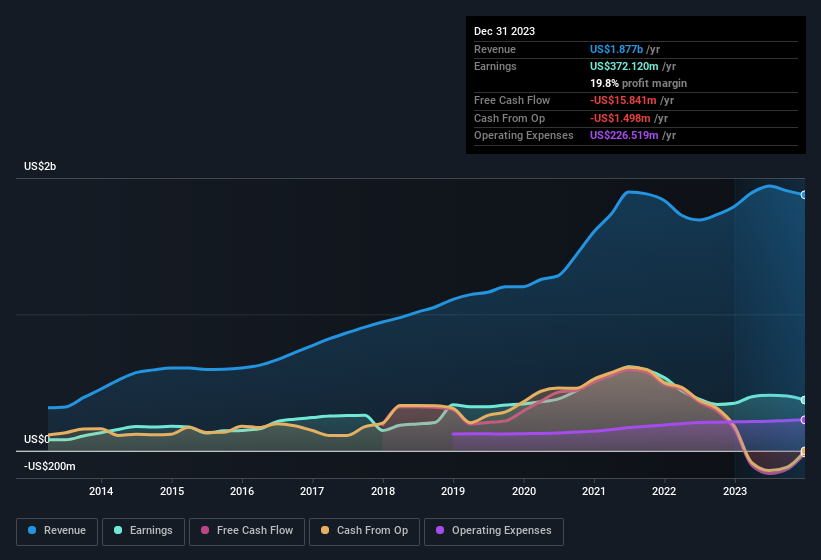- United States
- /
- Communications
- /
- NYSE:UI
We Think You Should Be Aware Of Some Concerning Factors In Ubiquiti's (NYSE:UI) Earnings

Ubiquiti Inc.'s (NYSE:UI) healthy profit numbers didn't contain any surprises for investors. We believe that shareholders have noticed some concerning factors beyond the statutory profit numbers.
Check out our latest analysis for Ubiquiti

A Closer Look At Ubiquiti's Earnings
As finance nerds would already know, the accrual ratio from cashflow is a key measure for assessing how well a company's free cash flow (FCF) matches its profit. The accrual ratio subtracts the FCF from the profit for a given period, and divides the result by the average operating assets of the company over that time. This ratio tells us how much of a company's profit is not backed by free cashflow.
As a result, a negative accrual ratio is a positive for the company, and a positive accrual ratio is a negative. While having an accrual ratio above zero is of little concern, we do think it's worth noting when a company has a relatively high accrual ratio. That's because some academic studies have suggested that high accruals ratios tend to lead to lower profit or less profit growth.
Ubiquiti has an accrual ratio of 0.57 for the year to December 2023. Statistically speaking, that's a real negative for future earnings. To wit, the company did not generate one whit of free cashflow in that time. Even though it reported a profit of US$372.1m, a look at free cash flow indicates it actually burnt through US$16m in the last year. It's worth noting that Ubiquiti generated positive FCF of US$156m a year ago, so at least they've done it in the past.
That might leave you wondering what analysts are forecasting in terms of future profitability. Luckily, you can click here to see an interactive graph depicting future profitability, based on their estimates.
Our Take On Ubiquiti's Profit Performance
As we have made quite clear, we're a bit worried that Ubiquiti didn't back up the last year's profit with free cashflow. For this reason, we think that Ubiquiti's statutory profits may be a bad guide to its underlying earnings power, and might give investors an overly positive impression of the company. The good news is that, its earnings per share increased by 7.3% in the last year. Of course, we've only just scratched the surface when it comes to analysing its earnings; one could also consider margins, forecast growth, and return on investment, among other factors. Keep in mind, when it comes to analysing a stock it's worth noting the risks involved. When we did our research, we found 4 warning signs for Ubiquiti (3 are a bit unpleasant!) that we believe deserve your full attention.
This note has only looked at a single factor that sheds light on the nature of Ubiquiti's profit. But there are plenty of other ways to inform your opinion of a company. For example, many people consider a high return on equity as an indication of favorable business economics, while others like to 'follow the money' and search out stocks that insiders are buying. So you may wish to see this free collection of companies boasting high return on equity, or this list of stocks that insiders are buying.
New: AI Stock Screener & Alerts
Our new AI Stock Screener scans the market every day to uncover opportunities.
• Dividend Powerhouses (3%+ Yield)
• Undervalued Small Caps with Insider Buying
• High growth Tech and AI Companies
Or build your own from over 50 metrics.
Have feedback on this article? Concerned about the content? Get in touch with us directly. Alternatively, email editorial-team (at) simplywallst.com.
This article by Simply Wall St is general in nature. We provide commentary based on historical data and analyst forecasts only using an unbiased methodology and our articles are not intended to be financial advice. It does not constitute a recommendation to buy or sell any stock, and does not take account of your objectives, or your financial situation. We aim to bring you long-term focused analysis driven by fundamental data. Note that our analysis may not factor in the latest price-sensitive company announcements or qualitative material. Simply Wall St has no position in any stocks mentioned.
About NYSE:UI
Ubiquiti
Develops networking technology for service providers, enterprises, and consumers.
Solid track record with excellent balance sheet.
Similar Companies
Market Insights
Community Narratives



